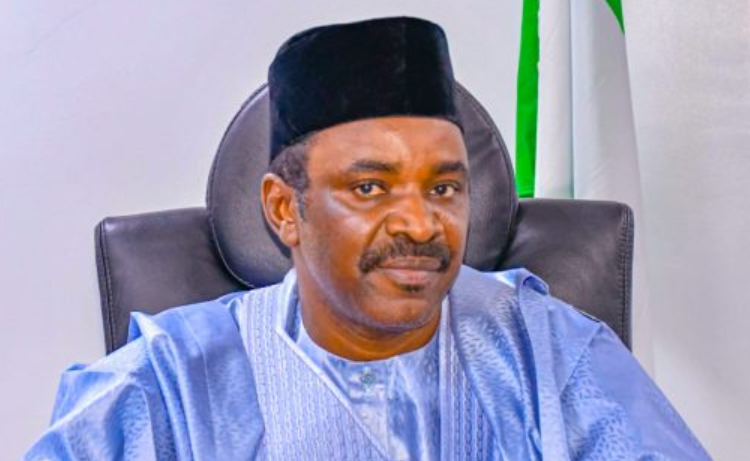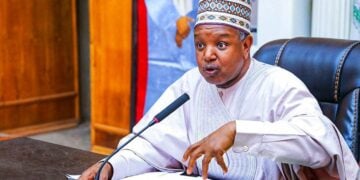The minister of Transportation, Senator Sa’idu Ahmed Alkali, and his Marine and Blue Economy counterpart, Adegboyega Oyetola have reaffirmed the federal government’s commitment to transforming the country’s transport and Marine sectors through massive infrastructure investment, manpower development, and policy reforms.
Speaking at the 2025 Nigeria Transport Sector Summit organised by the Transport Correspondents Association of Nigeria (TCAN) at Ikeja, Lagos, the Ministers both described the ongoing FG efforts as “critical to unlocking the nation’s economic potential and driving inclusive growth.”
Speaking, the Transportation Minister, Alkali praised President Bola Tinubu for championing far-reaching transport reforms under the Renewed Hope Agenda, saying the administration’s resolve is already reshaping Nigeria’s mobility landscape.
“The President has provided clear direction and commitment to making public transportation efficient, safe, integrated, and affordable. His administration’s policies are laying the foundation for a truly modern transport system,” Alkali said.
Alkali highlighted key achievements, including the ongoing modernization of several rail corridors. Among them is the Port Harcourt–Maiduguri rail line, where the Port Harcourt to Aba segment has been completed and operationalized.
The Kaduna–Kano and Kano–Maradi lines have also seen rapid progress, with execution levels now exceeding 50% and 60%, respectively—up from just 5–15% at the start of the administration.
“At the pace we are going, the Kano–Maradi line will reach Katsina by December 2025 and be ready for full completion by March 2027,” the Minister disclosed.
In addition, Alkali revealed plans for a High-Speed Rail network connecting Lagos, Abuja, Kano, and Port Harcourt—a project he said would redefine long-distance travel in Nigeria.
Also speaking, the minister of Marine and Blue Economy, Adegboyega Oyetola, said the new National Marine and Blue Economy Policy will cut logistics costs, boost trade competitiveness, and attract private sector investment into the transport and maritime sectors.
Oyetola, who was represented by the drector of Maritime Services Department of Federal of Marine & Blue Economy, Dr Mercy Ilori explained that the policy provides a framework for seamless intermodal integration across road, rail, barge, and pipeline channels, aimed at transforming Nigeria into a logistics hub for West and Central Africa.
“By lowering the cost of doing business, improving turnaround times, and creating an enabling environment for private capital, we are positioning Nigeria as a preferred logistics destination in Africa,” Oyetola said.
The minister highlighted key interventions already underway, including the operationalisation of the Lagos–Ibadan Standard Gauge Rail line for port cargo evacuation, expansion of barge operations at Lagos and Onne ports, completion of the Apapa–Oshodi Expressway, and the commissioning of the 27km Lekki Port Access Road.
He also pointed to the development of inland dry ports in Ibadan, Kaduna, Kano, and Funtua to ease pressure on seaports and support regional economies.
Oyetola stressed that the success of the reforms depends on collaboration among shipping lines, terminal operators, freight forwarders, investors, and regulators, adding that Nigeria must adopt digital, green, and climate-resilient logistics solutions to remain competitive globally.
However, Transportation experts at the summit emphasised the crucial role of innovation and sustainability in driving the transportation industry forward.
The summit had the theme,’’Driving the Transport Logistics Value Chains for Economic Growth.’’
Earlier in his welcome remarks, TCAN Chairman, Tola Adenubi, warned that Nigeria’s transport sector remains dangerously unbalanced, with over-reliance on road haulage leaving highways in disrepair and citizens at risk.
He cited the “daily menace” of falling containers, persistent boat mishaps on inland waterways, and chronic neglect of barge operations despite their potential to relieve road congestion and lower costs.
“At 65, Nigeria is yet to have an acceptable protocol to guide the entire transport system,” Adenubi lamented, urging government to enforce the 2023 Inland Waterways Transportation Code and invest in safer alternatives across rail and water.





